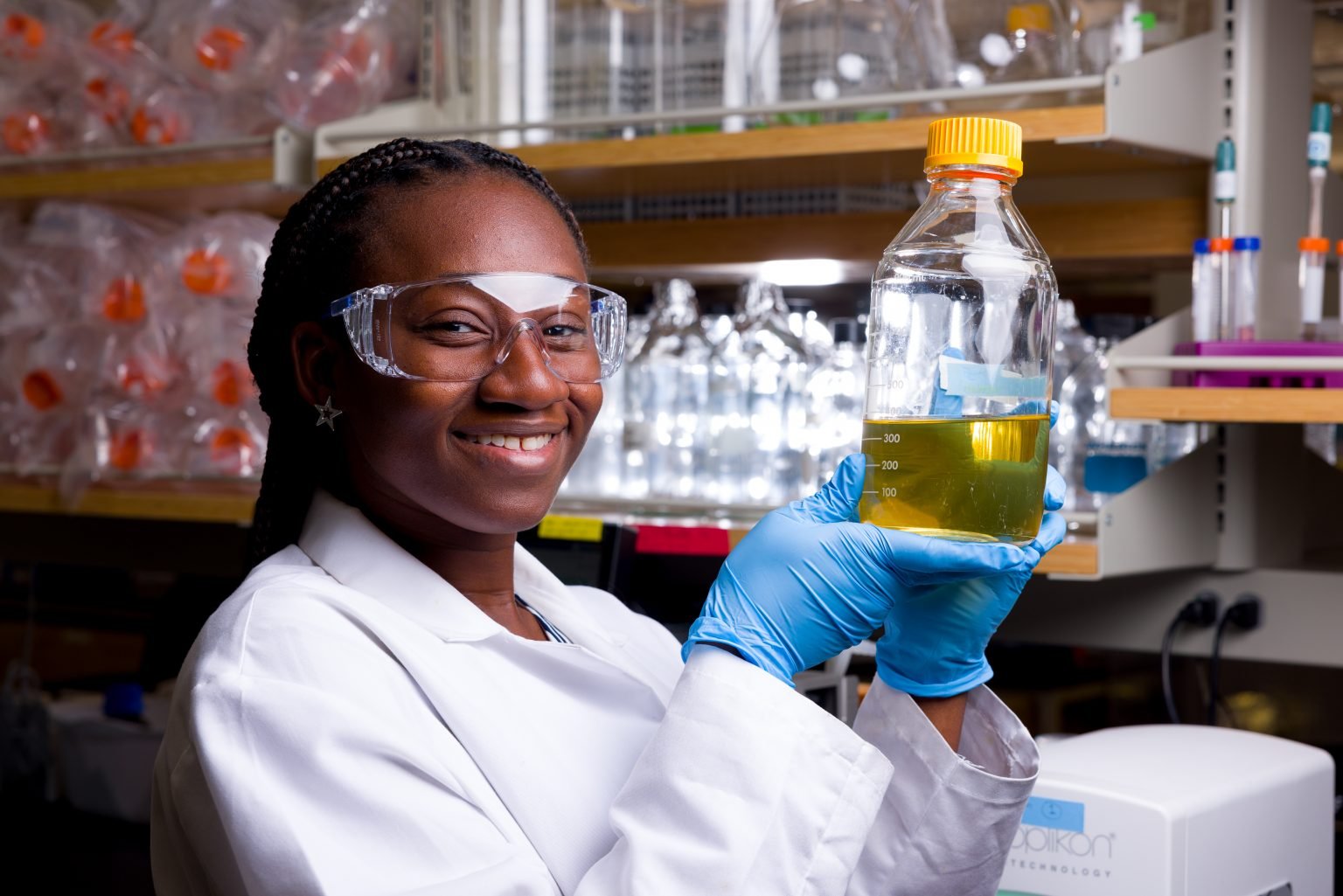
Technology & Innovation Projects
BioMADE is moving the bioindustrial manufacturing industry forward by funding innovative research, reducing barriers to scaling-up and commercialization, and de-risking investment in relevant infrastructure. BioMADE accelerates the commercialization of modern biotechnology products and identifies domestic supplies of important materials by focusing on the pilot-scale Manufacturing Readiness Levels (MRLs) 4-7.
Photo above © Iowa State University
© Ginkgo Bioworks
Manipulate
Projects that are developing predictive models, new tools, and robust platforms to ease the transition from lab to production scale.
Active Projects
-
This project will elevate the commercial readiness of bioproducts throughout the bioindustrial manufacturing ecosystem by benchmarking performance and best practices in product development at BioMADE member companies. Learn more here.
Members: University of California, Berkeley, R2DIO, Antheia, Geno, Amyris, Oobli
-
This project will establish a low-cost process for the production and recovery of healthy and sustainable oils and fats from fermentations. Learn more here.
Member: University of Delaware
-
This project will advance innovative, proof-of-concept biomanufacturing platforms and technologies for rapid, cost-effective, distributed domestic manufacturing of antigens to use in testing and medical treatments for coronaviruses. Learn more here.
Members: University of California, Davis, Boston University, University of Texas-Austin, Johns Hopkins University, University of Georgia, and Rensselaer Polytechnic Institute
-
This project will establish and evaluate Deep Stability Scanning, a method that synergizes advances in DNA synthesis, machine learning-enabled protein design, and high-throughput screening, for protein engineering. Learn more here.
Members: University of Texas at Austin and Twist Bioscience
-
Researchers are collaborating to improve intracellular product recovery from yeast systems by engineering programmed lysis of the cell wall. Learn more here.
Members: Manus and University of Texas at Austin
Completed Projects
-
Through this project, Agri-Tech Producers came one step closer to making sustainable high-performance, lightweight bio-based materials that can be used in aerospace, automotive, and sports and recreation industries. Learn more here.
Members: Agri-Tech Producers, University of Akron School of Polymer Science and Polymer Engineering
-
Members teamed up to produce and characterize novel magnetic nanoparticles called magnetosomes which are suitable for a wide range of applications including advanced electronics, batteries, and satellite communications. Learn more here.
Members: Superbrewed Food, Lockheed Martin
-
Through this project, members evaluated the suitability of the H.E.L. BioXplorer 400P bioreactor system for simulating scaled-up fermentation bioprocess conditions. Learn more here.
Members: Checkerspot, University of California, Davis
© North Carolina State University
Accumulate
Projects that are producing relevant quantities of materials as quickly and efficiently as possible.
Active Projects
-
This project will adapt promising pre-treatment technologies for bioindustrial manufacturing with feedstocks from Hawaii, conduct training for remote rural environments, and include culturally appropriate approaches to ensure community acceptance. Learn more here.
Members: National Corn-to-Ethanol Research Center and University of Hawai‘i – Hilo
-
This project will provide a flexible, modular, and redeployable bioreactor design that integrates product extraction and separation into the bioreactor itself. Learn more here.
Member: Iowa State University
-
This project is scaling up the domestic biomanufacturing and downstream process capacity of microalgae oil production. Learn more here.
Member: Checkerspot
-
This project will demonstrate technical, economic, and societal feasibility of novel, decentralized biomaterials manufacturing. Learn more here.
Members: Mango Materials, University of California, Davis, Black & Veatch
-
This project will create a generalizable machine learning framework for optimization and control of bioreactors to reduce resources needed to design new processes and improve product quality throughout production. Learn more here.
Members: Iowa State University, Novonesis
-
This project will accelerate the commercialization of the anaerobic bio-production of 3-hydroxypropionic acid (3-HP) – an important molecule that’s a precursor to the $25 billion acrylates industry – by leveraging existing ethanol infrastructure. Acrylates have diverse applications, including consumer products paints, and adhesives. Learn more here.
Members: Bluestem Biosciences, ideaCHEM, Iowa State University, Southeast Community College
-
By harnessing cutting-edge technology, this project will convert diverse organic waste streams into high-value medium-chain carboxylic acids (MCCAs) such as caproic and caprylic acid. These bioproducts serve as pivotal platform chemicals for a multitude of applications, including as materials, consumer products, chemicals, and fuels. Learn more here.
Members: Johns Hopkins Whiting School of Engineering, Technology Holding, CleanJoule
Completed Projects
-
This research focused on production of bio-based alternatives to petroleum-derived acrylic acid using a minimally engineered microbial strain. Learn more here.
Member: MicroByre
-
Researchers created and commercialized a new biopolymer precursor through sugar fermentation. The trademarked product, Nuvone, can be used in flexible polymers such as plastics, foams, and adhesives; as well as in textiles such as leggings and shoes. Learn more here.
Members: Valerian Materials, National Corn-to-Ethanol Research Center, University of Minnesota
-
This project advanced a modular bioreactor system that creates vitamin A through locally sourced, waste-based feedstocks. Learn more here.
Members: Capra Biosciences, Boston University, Next Rung Technology
-
Researchers developed a new, cost-effective way to make succinic acid through via fermentation. Succinic acid is an important commodity chemical used in everything from polymers, agricultural products, food and beverages, skincare, and more. Learn more here.
Member: University of Illinois at Urbana-Champaign
© Amyris
De-Risk
Projects that are exploring new technologies, particularly around scale-up and downstream processing, and partnering with stakeholders to clarify market potential.
Active Projects
-
Using cell recycling this project will explore, research, test, and validate methods to improve fermentation process yields from bacterial biocatalysts. Learn more here.
Member: Geno
-
This project will advance biomanufacturing of lubricants from food waste streams, providing a more secure and locally available domestic supply chain of DoD-relevant materials. Learn more here.
Members: Capra Biosciences and Virginia Tech
-
This project brings together scientists and engineers from industry and academia to develop and demonstrate pilot-scale manufacturing of several lipid adjuvants to support coronavirus vaccine production. Learn more here.
Members: Amyris and University of California, Berkeley
-
This project will evaluate scale-down approaches in microbioreactors and their applicability in predicting deployment of process analytical technology and fermentation performance throughout scale-up. Learn more here.
Members: North Carolina State University
-
This project will domestically biomanufacture Ecoteria™, a bio-based malonate product platform. Using downstream processing technology, bio-based malonic acid from fermentation solutions is turned into Ecoteria, which includes malonate esters dimethylmalonate (DMM) and diethylmalonate (DEM). Learn more here.
Member: Lygos
-
This project focuses on developing and validating workflows to predict the performance of oil-producing fermentations at demo-scale based on laboratory experiments. Learn more here.
Member: Geno
-
Through this project, member Superbrewed Food will produce sustainable protein, formulate it into a format that would be desired by warfighters, and conduct ex vivo studies to identify the nutrition and functional food benefits associated with their postbiotic protein ingredient. Learn more here.
Member: Superbrewed Food
-
This project will evaluate a modification to both the design and operation of an aseptic production fermentor in order to minimize or eliminate the inhibitory impact of certain recombinant products. Learn more here.
Members: Amyris, Sudhin Biopharma
-
Researchers are developing a novel cell-free approach for isobutanol production. This technology creates complex yet robust cell-free enzyme systems that sustainably and affordably produce diverse chemicals. Learn more here.
Members: eXoZymes and University of Georgia
-
This project will use a patented microbe to turn waste materials (carbon dioxide, ethanol, and methane) into a biodegradable plastic and produce enough to test for commercial use. Learn more here.
Member: Industrial Microbes
Completed Projects
-
This project tested a novel approach for in-situ product removal (ISPR) of growth-inhibitory products in a 20-liter bioreactor using an oil-based solvent perfusion method. Learn more here.
Members: Amyris
-
Tandem Repeat created Squitex, a fermentation-enabled protein that uses a gene originally found in the tentacles of the squid. Fermented using sugar and glycerol, this fiber has the potential to be self-healing. Learn more here.
Member: Tandem Repeat
Execute
Projects that are focusing on manufacturing at pilot and intermediate scale to readily transition to production partners.
Active Projects
-
This project is investigating the use of spent yeast as a feedstock for textile fibers. The textile fibers from spent yeast also offer the potential to reduce burns caused by fire or explosion, compared to synthetic fibers. Learn more here.
Members: Tandem Repeat, ARCTOS Technologies, University of Georgia
-
Using feedstocks such as soybean molasses, bagasse, and wood residues, member Origin Materials will develop samples of bio-based, carbon-negative carbon black and polymers. Learn more here.
Members: Origin Materials, University of California-Davis
-
This project will demonstrate the viability and scalability of member Kultevat’s procedures and processes for producing natural rubber and plant-based resins from the dandelion Taraxacum kok-sakgyz (TKS). Learn more here.
Members: Kultevat, FutureFuel Chemical Company
Completed Projects
Stay tuned!
© WNDR Alpine | Checkerspot
Commercial Readiness
Projects that are integrating simulation systems, technoeconomic analysis, and life cycle assessment of developing biotechnologies.
Active Projects
-
This project will develop a cost-competitive, domestic manufacturing process for carbon fiber using waste products such as ethanol and carbon dioxide. Carbon fiber has many applications, including defense, aerospace, and commercial. Learn more here.
Members: Industrial Microbes, Georgia Institute of Technology, FERMWORX
-
This project is developing methods to scale-up the conversion and recovery of fatty acids precursors for aviation fuel. Learn more here.
Members: Iowa State University, Kansas State University, Quasar Energy Group
-
This project will build the next-generation standard for assessment of sustainable bioprocesses with JIMSONIC, the Joint Integrated Modeling for Systematic Optimization of eNvironmental Impacts and Costs. Learn more here.
Member: Amyris
-
Researchers are developing a state-of-the-art methodology for fermenter design and scale-up. Learn more here.
Members: Iowa State University, Cargill, Geno
Completed Projects
-
Through this project, member General Probiotics developed a live therapeutic that can be added to chicken feed to support the production of healthy, sustainable, and affordable animal protein. Learn more here.
Member: General Probiotics
-
Through the development and implementation of a sophisticated digital simulation platform, this project enhanced the resilience of bioindustrial supply chains and addressed critical gaps in supply chain design and operations. Learn more here.
Member: Georgia Institute of Technology





